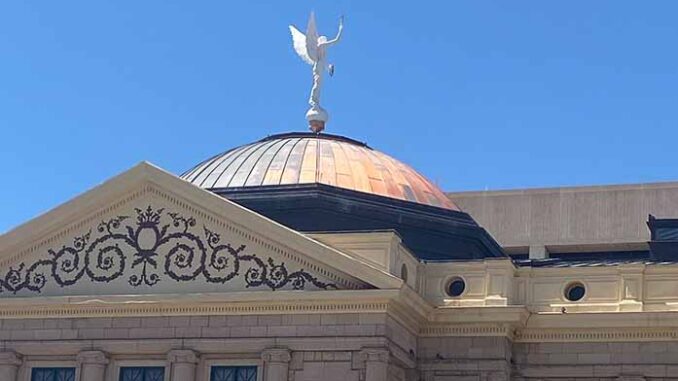
At week 7, we have reached the crossover point, which is the approximate midpoint of the 2022 legislature. This means that, with some exceptions, bill activity in one chamber will be limited to those bills that survived in the other chamber.
From our perspective, the most significant event this week was the passing, in both chambers, house bill HCR2039. This is the bill that increases the K-12 aggregate expenditure limit by over 1.1 billion dollars. This bill has been discussed at length elsewhere. Therefore, we will limit our comments to a brief outline:
- This bill was passed in both chambers under a suspension of the rules, meaning that the mandatory committee hearings were ignored, and there was no opportunity for discussion and debate. This is irresponsible behavior by our legislature, considering that so much of taxpayer money is in play.
- It was unnecessary, since the AZ constitution already provides for adjustments for student enrollment and inflation, plus an additional 10% automatic increase.
- This was a well-orchestrated scheme by the public schools because there is no way that such a gigantic “shortage” of funds could have occurred overnight.
- This move may have been done in order to affect the status of Prop 208, the largest income tax increase in AZ history. Since the reason for 208’s unconstitutionality was that it exceeded the expenditure limit, it makes sense that increasing the limit would render that decision irrelevant.
There was plenty of other activity this week, some good, some not so good:
HB2674 – municipal zoning; by right housing
We are philosophically opposed to the use of strike-everything amendments, but in the case of HB2674, it accomplished a good purpose. Initially, this bill would have caused the state to take over local zoning of properties, in an effort to offset the current, near critical shortage of housing. However, as a result of a strike-all amendment, this bill now only establishes the Housing Supply Study Committee. The mission of this committee is to study the problem and offer possible courses of action. This is a much better way to approach the problem.
HB2721 – law enforcement officers: AZPOST
This bill outlines requirements for any government committee, board, agency, department, office or entity (investigating agency) that investigates law enforcement officer (LEO) misconduct.
This measure is needed to offset the current infatuation of leftists with crippling law enforcement officers’ ability to do their job. It passed the House Third Reading along party lines, 31-28.
SB1152 – zero emission vehicles; plans
SB1154 – transportation electrification study committee
These are two of five bills aimed at forcing the transition to electric vehicles regardless of personal choice, efficiency or cost. These two cleared the full Senate when several Republicans joined the Democrats in their YES votes. It is a shame that this irresponsible behavior is being supported by some Republicans, but that is the world we live in today. The other three electric vehicle bills, SB1150, SB1151, and SB1153 appear to be headed for a similar success in the full Senate.
SB1571 – ballot drop boxes; surveillance; appropriation
This bill prohibits voted early ballots from being returned by mail. Outlines requirements for ballot drop-boxes, including: 1) acceptance of ballots and ballot batches; 2) generating receipts; 3) cameras or recording systems; and 4) preventing the ballot box from accepting ballots if the camera or recording system is malfunctioning. Appropriates a yet to be determined amount from the state General Fund (state GF) in FY 2022 to the Secretary of State (SOS).
SB1571 is a significant step toward the improvement of ballot security. It passed the Senate Appropriations Committee 6-4.
For a complete report on the bills that we have been tracking, including links to the text of the bills themselves, go to REPORT
